In a world where children’s activities are increasingly dominated by screens and digital interactions, finding an activity that nurtures both the body and mind has never been more crucial. Enter Jiu-Jitsu — a grappling martial art that has been steadily gaining popularity due to its accessibility and character development. Originating from ancient combat techniques, Jiu-Jitsu has evolved into a modern-day martial art that not only teaches self-defense but also fosters physical fitness, mental resilience, and emotional growth.
As parents, we seek the best for our children, striving to provide them with opportunities that will shape them into well-rounded individuals. Jiu-Jitsu stands out as a transformative practice that can help achieve this goal. It is more than just a sport; it is a way of life that instills discipline, builds confidence, and cultivates respect.
In this blog, we will explore the major ways in which this grappling sport can positively influence a child’s development, making it a true miracle in today’s fast-paced, ever-distracted world.
Physical Benefits
This is probably the most obvious area of benefits, though the depth of what people receive here is often as underrated as the others we will discuss. Jiu-Jitsu offers a seriously comprehensive workout that engages virtually every part of the body, providing numerous physical benefits for children as they grow up.
The rigorous training sessions involve a mix of aerobic and anaerobic exercises that boost cardiovascular health, build muscle strength, and increase flexibility and range of motion. Children who practice regularly will develop significantly better coordination and balance, which are crucial for strength, agility, and overall physical development.
Healthy Lifestyle Habits
Participating in Jiu-Jitsu encourages children to adopt healthy lifestyle habits, especially if they are competing at all. The discipline and commitment required for training naturally extend to other areas of their lives, fostering a sense of responsibility and self-efficacy toward maintaining their health and well-being. This tends to lead kids toward making healthier dietary choices and understanding the importance of regular physical activity so that they can perform at their best. It essentially provides context for why being healthy matters instead of solely “because Mom said so”. 
As children engage in Jiu-Jitsu, they not only become physically stronger but also learn the value of perseverance and hard work in the process of developing their ability to move against their opponents. These physical benefits lay a solid foundation for a healthy and active lifestyle that can last a lifetime.
Mental and Emotional Benefits
Jiu-Jitsu is not just about physical prowess; it is also a powerful tool for mental and emotional development. The practice instills a range of positive traits that contribute to a child’s overall well-being and personal growth.
Boosted Self-Confidence
Achieving new skills and progressing through the ranks in Jiu-Jitsu gives children a significant confidence boost. The sense of accomplishment that comes from mastering techniques and earning belts is unparalleled – there is simply nothing like going from white belt to blue belt. This newfound self-assurance transcends the dojo, helping children tackle challenges in school and social settings with greater confidence as they understand that they are indeed capable of making things happen in the world.
Enhanced Focus and Discipline
Jiu-Jitsu training requires a high level of concentration and discipline. Children must pay close attention to their instructors, follow detailed instructions, learn complex techniques, and practice consistently to improve. This discipline and focus not only improve their performance in Jiu-Jitsu but also translate into better academic performance and more disciplined behavior in most other aspects of their lives.
Emotional Resilience
Listen, Jiu-Jitsu is hard, and the journey of the process of learning is filled with a lot of challenges and setbacks. Children learn to handle failure, cope with frustration, and persevere through difficult times. This emotional resilience is invaluable as they grow into adulthood, teaching them to view obstacles as opportunities for humility and growth rather than as insurmountable barriers.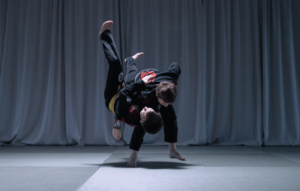
Through regular practice, children develop a stronger sense of self, greater emotional stability, and the mental fortitude needed to navigate the complexities of growing up.
Social Benefits
Jiu-Jitsu offers a unique environment where children can develop crucial social skills and form meaningful relationships. The surprisingly inclusive and supportive nature of the sport fosters a sense of community and belonging. 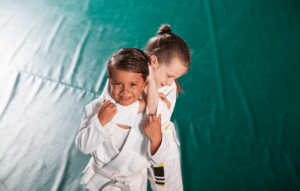
Because Jiu-Jitsu is such a niche sport, training provides children with the opportunity to interact with peers from diverse backgrounds. They learn to work together, support one another, and celebrate each other’s successes. These interactions help children develop essential social skills, such as effective communication, empathy, and teamwork. The friendships formed on the mat often extend beyond the dojo, creating a strong social network.
Anti-Bullying Benefits
Another obvious yet not-so-obvious benefit is that martial arts empower children with self-defense skills, boosting their confidence and reducing their risk of being bullied. This isn’t some Taekwondo stuff though; Jiu-Jitsu is comparatively one of the most effective martial arts in existence, allowing people with even a basic understanding to submit much larger and stronger opponents who are untrained in the sport.
Most importantly, Jiu-Jitsu teaches kids the importance of respect and humility. Children learn that physical strength should be used responsibly and that conflicts can often be resolved without outright violence. This mindset not only helps them stand up for themselves but also encourages them to become advocates for others who may be facing bullying.
In practice, children will gain valuable social experiences and learn the importance of mutual respect, making them more well-rounded and socially adept individuals.
Personal Development
Jiu-Jitsu is a powerful catalyst for personal growth, instilling values and skills that contribute to a child’s character and life philosophy.
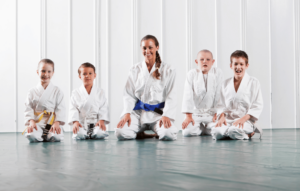
Resilience and Perseverance
One of the core lessons in of doing difficult things learning how to handle adversity. The sport teaches children that failure is not a setback but an essential part of the learning process. By facing and overcoming challenges on the mat, children develop resilience and perseverance. These qualities help them navigate life’s difficulties with a positive and determined attitude.
Respect and Humility
The sport emphasizes the importance of respect for oneself and others. Children are taught to respect their instructors, training partners, and opponents. This respect extends beyond the dojo, influencing how they interact with others in their daily lives. Additionally, the practice fosters humility as children recognize that there is always more to learn, no matter their level of expertise.
These elements of personal development contribute to building strong, respectful, and humble individuals who are equipped to handle various life situations with grace and dignity.
Effect on Academics
The focus and discipline learned in martial arts also lead to better academic performance. The ability to concentrate during training sessions translates into improved focus in the classroom. Additionally, the goal-setting and achievement-oriented nature of Jiu-Jitsu can inspire children to set and reach academic goals in a pragmatic way.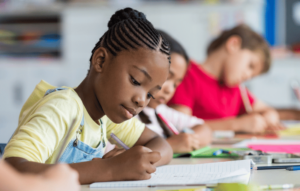
Stress Relief and Mental Health
Training provides an effective outlet for stress and anxiety. The physical activity involved helps release endorphins, which are natural mood enhancers. Regular training sessions offer a break from academic pressures and other stressors, contributing to better mental health and a more balanced lifestyle.
Closing Thoughts
Jiu-Jitsu is so much more than just a martial art; it’s a transformative practice that offers a wide range of benefits for children. From physical fitness and mental resilience to social skills and academic improvement, the impact can be profound. As we navigate the challenges of the modern world, providing children with opportunities like Jiu-Jitsu can help them grow into well-rounded, confident, and capable individuals.
The physical benefits of Jiu-Jitsu are clear; the more kids train they will slowly but surely become stronger, more flexible, and develop better coordination. This foundation of physical fitness encourages a healthier lifestyle, promoting habits that will benefit them well into adulthood. Beyond the physical, Jiu Jitsu instills mental toughness, discipline, and a growth mindset. Children learn to overcome challenges, handle failure with grace, and persist in the face of adversity, building a resilient character that will serve them in all areas of life.
Socially, Jiu-Jitsu provides a supportive community where children can form lasting friendships and learn important values like respect, teamwork, and empathy. These interactions help them develop strong social skills, which are crucial for their personal and professional lives. Additionally, the anti-bullying aspects of Jiu Jitsu empower children, teaching them to defend themselves while promoting non-violent conflict resolution.
Academically, the focus and discipline gained from martial arts training tend to translate into improved performance in school. Children learn to manage their time effectively, set and achieve goals, and balance their academic responsibilities with their training. The stress relief provided by regular intense exercise also contributes to better mental health, allowing children to approach their studies with a clear and focused mind. 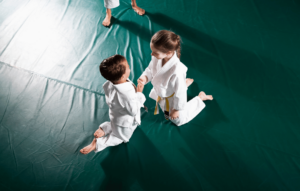
In conclusion, Jiu-Jitsu is a powerful tool for shaping the future of our children. It equips them with the physical, mental, and social skills needed to thrive in an ever-changing world. Encouraging your child to embark on the Jiu-Jitsu journey is an investment in their holistic development. The lessons they learn on the mat will stay with them for a lifetime, shaping their character and enriching their lives in ways beyond measure. By embracing this time-tested practice, we can help our children unlock their full potential and lead fulfilling, empowered lives.







